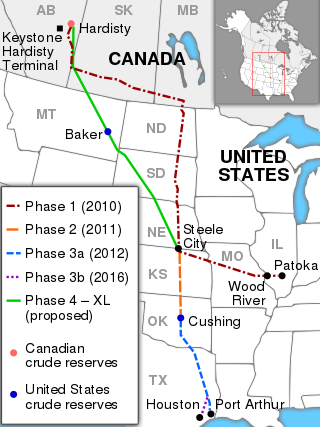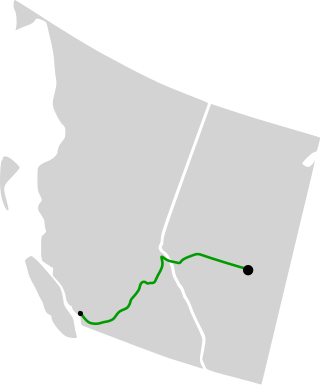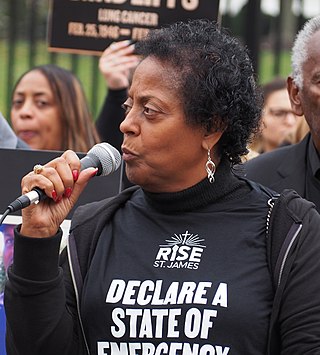
Vancouver International Airport is an international airport located on Sea Island in Richmond, British Columbia, serving the city of Vancouver and the Lower Mainland region. It is located 12 km (7.5 mi) from Downtown Vancouver. YVR is the second busiest airport in Canada by passenger traffic, behind Toronto Pearson International Airport in Ontario. As a trans-Pacific hub, the airport has more direct flights to China than any other airport in North America or Europe. It is a hub for Air Canada and WestJet. Vancouver International Airport is one of eight Canadian airports that have US Border Pre-clearance facilities. It is also one of the few major international airports to have a terminal for scheduled float planes.

Tesoro Corporation, known briefly as Andeavor, was a Fortune 100 and a Fortune Global 500 company headquartered in San Antonio, Texas, with 2017 annual revenues of $35 billion, and over 14,000 employees worldwide. Based on 2017 revenue, the company ranked No. 90 in the 2018 Fortune 500 list of the largest United States corporations by total revenue.

The Goldman Environmental Prize is a prize awarded annually to grassroots environmental activists.

Cancer Alley is the regional nickname given to an 85-mile (137 km) stretch of land along the Mississippi River between Baton Rouge and New Orleans, in the River Parishes of Louisiana, which contains over 200 petrochemical plants and refineries. This area accounts for 25% of the petrochemical production in the United States. Environmentalists consider the region a sacrifice zone where rates of cancer caused by air pollution exceed the federal government's own limits of acceptable risk.

Teck Resources Limited, known as Teck Cominco until late 2008, is a diversified natural resources company headquartered in Vancouver, British Columbia, that is engaged in mining and mineral development, including coal for the steelmaking industry, copper, zinc, and energy. Secondary products include lead, silver, gold, molybdenum, germanium, indium and cadmium. Teck Resources was formed from the amalgamation of Teck and Cominco in 2001.

Formosa Plastics Corporation is a Taiwanese plastics company based in Taiwan that primarily produces polyvinyl chloride (PVC) resins and other intermediate plastic products. It is the corporation around which influential businessman Wang Yung-ching formed the Formosa Plastics Group, and it remains central to the Group's petrochemical operations. The president of Formosa Plastics Corp. (FPC) is Jason Lin (林健男).

The Keystone Pipeline System is an oil pipeline system in Canada and the United States, commissioned in 2010 and owned by TC Energy and, as of March 2020, the Government of Alberta. It runs from the Western Canadian Sedimentary Basin in Alberta to refineries in Illinois and Texas, and also to oil tank farms and an oil pipeline distribution center in Cushing, Oklahoma.
The Port of Vancouver USA, founded in 1912, is a deep-water port located in Vancouver, Washington along the Columbia River. The port contains five terminals, along with two of the largest mobile harbor cranes in North America which are typically used to unload wind energy equipment.
Sarah Agnes James is a Neets'aii Gwich'in activist from Arctic Village, Alaska, USA, but was born in Fort Yukon "because that is where the hospital was. I grew up part of the time in Fort Yukon and Salmon River, but most of the time in Arctic Village, Alaska."James is a board member of the International Indian Treaty Council. She was awarded the Goldman Environmental Prize in 2002, together with Jonathon Solomon and Norma Kassi. They received the prize for their efforts to protect the Arctic National Wildlife Refuge (ANWR) from plans of oil exploration and drilling. Oil and gas exploration would disturb the life cycle of the Porcupine caribou, which has been a foundation for the Gwich'in culture since approximately 18,000 BC.
Marina Petrovna Rikhvanova is a Russian ecologist and leader of the Baikal Ecological Wave (BEW) organization which protects Siberia's Lake Baikal from ecological damage. Lake Baikal, the world's biggest reservoir of fresh water, is currently under threat from industrial pollution. In 2008, Rikhvanova was awarded the Goldman Environmental Prize.
Ambre Energy Limited is an Australian coal and oil shale company. It has offices in Brisbane and Salt Lake City.
Maria Gunnoe is a native West Virginian who opposes mountaintop removal mining, and is a winner of the Goldman Prize and Wallenberg Medal.
Sven Peek, best known as Bobby Peek, is an environmentalist and activist from Durban, South Africa. He was awarded the Goldman Environmental Prize in 1998, for his efforts on improvement of pollution problems in the region of South Durban.
Diane Wilson is an American environmental activist, an anti-war activist, and an author. In 1989, she was a shrimp boat captain in Calhoun County, Texas, and she saw an Associated Press article saying that the county had the most toxic waste disposal of all counties in America. Texas produces the most amount of chemical waste than any other state in the United States, with the majority of the pollution concentrated on the state's Gulf Coast. Wilson began a campaign against Formosa Plastics, a Taiwanese chemical company then building a PVC facility near her town, with tactics including several hunger strikes and sinking her own boat to draw attention to the matter. In 1994 she won "zero discharge" agreements from Formosa and Alcoa.

The Trans Mountain Pipeline System, or simply the Trans Mountain Pipeline (TMPL), is a multiple product pipeline system that carries crude and refined products from Edmonton, Alberta, to the coast of British Columbia, Canada.

Uroš Macerl is an organic farmer and environmental activist from Slovenia. He won the Goldman Environmental Prize in 2017 after leading a successful legal challenge against the company operating a cement kiln that was incinerating hazardous waste near his farm.

Ana Čolović Lešoska is a Macedonian biologist who since 2011 has campaigned against the construction of dams for hydroelectric power production in the Mavrovo National Park in order to safeguard threatened species, including the Balkan lynx. This led to the withdrawal of loans from the World Bank and the European Bank for Reconstruction and Development (EBRD), convincing the Government of North Macedonia to suspend further work on dams in the national park. In recognition of her efforts, in April 2019 she was one of six environmentalists to be awarded the Goldman Environmental Prize.

Sharon Lavigne is an American environmental justice activist in Louisiana focused on combating petrochemical complexes in Cancer Alley. She is the 2022 recipient of the Laetare Medal, the highest honor for American Catholics, and a 2021 recipient of the Goldman Environmental Prize.

Destiny Watford is an American environmental activist. She won a Goldman Environmental Prize in 2016.
Maia D. Bellon is an American attorney and former government official from the State of Washington. She served as Director of the Washington Department of Ecology from 2013 to 2020. A member of the Mescalero Apache, Bellon was the first Native American to serve as a member of the Washington cabinet.












